
In the spirit of Kevin Rudd’s apology to the Stolen Generations, a team of academics from The University of Queensland is set to evaluate how problem-based learning (PBL) is used in the teaching of Indigenous Australian Studies.
Based at UQ’s Aboriginal and Torres Strait Islander Studies Unit and led by Dr Liz Mackinlay, the team has received a $220,000 grant from the Australian Learning and Teaching Council.
Project Manager Dr Katelyn Barney said there were similarities between problem-based learning and Aboriginal methods of knowledge transfer, suggesting it was a suitable approach for teaching Indigenous Studies.
“The autonomous, embodied and experiential nature of teaching and learning is a striking attribute of Indigenous cultures,” Dr Barney said.
“Our contention is that PBL is transformative – it provides an engaged, dialogic, reflective and critical approach for students to come to an understanding of the history and contemporary reality of Indigenous people’s lives, the impact of colonialism, and Indigenous and non-Indigenous relationships.
“Although there has been much research on the effectiveness of PBL in other areas such as health science and medical education, natural sciences and professional degrees, there has been very little study of the effectiveness of this approach in relation to Indigenous education globally.”
PBL – which often involves working in small groups with a lecturer or a tutor who facilitates discussions and learning – assists students to ‘learn how to learn’.
A pilot study investigating the use of PBL in UQ’s Aboriginal and Torres
Strait Islander Perspectives course will be conducted during semester one, 2010.
Observational classroom data, focus group interviews with students, lecturer reflections and assessed student work will be used to ascertain the effectiveness of the teaching method.
Dr Mackinlay, who has been developing and refining the PBL method over the past 10 years, said outcomes of the project had the potential to improve understanding between Indigenous and non-Indigenous Australians.
“In his 2008 national apology to the Stolen Generations, the Prime Minister promised that the apology would open up new possibilities for the future, and importantly, allow non-Indigenous Australians to ‘see our indigenous brothers and sisters with fresh eyes, new eyes” and minds wide open’,” Dr Mackinlay said.
“This project is proposed in the spirit of the Prime Minister’s call for new ways of thinking about old problems.
“By exploring PBL as a method to transform beliefs, actions and lives, the study can help build a better future between Indigenous and non-Indigenous Australians.
“More comprehensively understanding how PBL works as transformative education will have far-reaching effects in Indigenous tertiary education and beyond across the nation.”
The project is a collaboration between Indigenous and non-Indigenous researchers at five key centres of teaching in Indigenous Australian Studies that use PBL approaches: The University of Queensland, Monash University, University of Technology Sydney, Charles Darwin University, and University of Newcastle.
After the UQ pilot study has been completed, similar evaluations will be conducted by each of the partner institutions.
A website maintained by the project member at UNSW will share the progress and results of this project, and provide a forum for discussion with other universities that engage in teaching Indigenous Studies on an ongoing basis.
The study will begin in January 2010.
Media: Dr Liz Mackinlay/ Dr Katelyn Barney (07 3365 6712, k.barney@uq.edu.au) or Penny Robinson at UQ Communications (07 3365 9723, penny.robinson@uq.edu.au)
.jpg)



